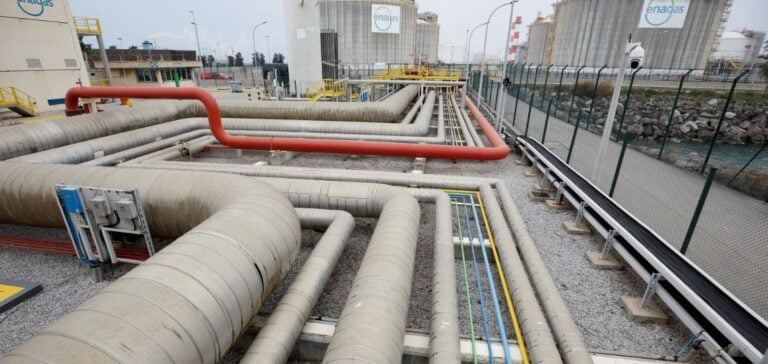The city of Barcelona, in partnership with Veolia and Enagás, has officially launched the first urban network using residual cold from the regasification of liquefied natural gas (LNG). Located in the Port of Barcelona, this innovative project represents a major milestone for energy transition and the decarbonization of local infrastructure.
In LNG regasification terminals, LNG, transported by ships at a temperature of -160°C, is converted into natural gas at ambient temperature using seawater. Thanks to innovative technology developed by Enagás and Veolia, this process recovers and valorizes the residual cold to power a low-carbon energy network. This sustainable energy is distributed to strategic infrastructures such as the Fira de Barcelona and the offices of the Generalitat de Catalunya.
An exemplary energy efficiency project
Each year, this network generates 131 GWh of low-carbon energy, equivalent to the consumption of a city like Reus in Catalonia, with 100,000 inhabitants. Moreover, it prevents 32,000 tons of CO2 emissions annually, corresponding to 110 round trips between Barcelona and New York.
This project is part of Veolia’s GreenUp strategy, dedicated to the ecological transformation of the energy mix. Arturo Gonzalo, CEO of Enagás, emphasized that this technology, applicable to over 150 regasification terminals worldwide, could play a crucial role in harnessing untapped energy resources while enhancing energy sovereignty.
A model of public-private collaboration
This project, initiated in 2009, is the result of close cooperation between Veolia, Enagás, and the municipality of Barcelona. This synergy has enabled the development of a solution tailored to local energy needs, while also boosting the competitiveness of the region’s port and tertiary infrastructures.
An agreement has also been signed with Mercabarna, Barcelona’s main food market. This partnership aims to supply eight pavilions dedicated to fruits, vegetables, and seafood with the cold energy generated by the LNG terminal. This initiative highlights the direct impact of this technology on the industrial and commercial sectors.
An internationally replicable solution
The success of this project opens global opportunities. Veolia and Enagás have signed an agreement to replicate this model in other terminals in Spain and abroad. “We must leverage all untapped energy potential to reduce waste and inefficiency,” said Estelle Brachlianoff, CEO of Veolia. This project demonstrates the feasibility of local solutions to address global energy transition challenges.
Through this innovation, Barcelona positions itself as a global reference for energy efficiency and resilience to climate change while offering a concrete response to decarbonization challenges.






















